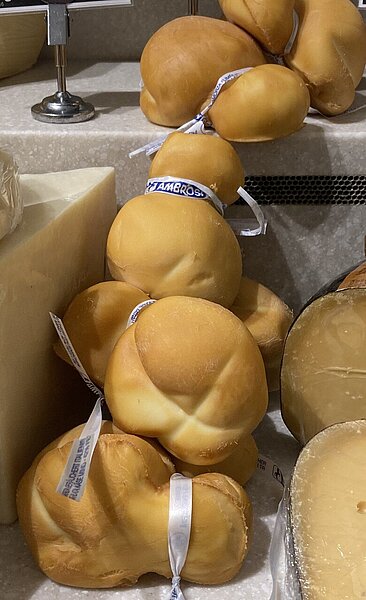Scamorza

For many, cheese is the epitome of enjoyment and variety in the culinary world. Among the many types of cheese, Scamorza stands out with its unique taste and texture. But what about the compatibility and safety of Scamorza when it comes to our four-legged friends? In this article, we take a closer look at Scamorza, its properties and how it can affect dogs.
What is Scamorza?
Scamorza is a southern Italian cheese traditionally made from cow's milk, although there are also varieties made from sheep's milk. The cheese belongs to the pasta filata family, which also includes mozzarella, and is known for its elastic texture and slightly smoky flavor, especially when smoked. Scamorza is made using a special process in which the curd is heated and then pulled by hand until it reaches its characteristic smooth and firm texture. The cheese is then formed into a pear shape and sometimes smoked to enhance its flavor.
Scamorza in the dog menu: Pros and cons
Incorporating cheese, including scamorza, into a dog's diet should be carefully considered. Here are some of the potential pros and cons:
Pros:
- Protein source: scamorza is rich in protein, which is important for building and maintaining muscle tissue in dogs.
- Calcium content: Cheese contains calcium, which is necessary for healthy bones and teeth in dogs.
- Taste: Many dogs enjoy the taste of cheese, which can make it a useful tool when giving medication or as a reward during training.
Disadvantages and risks:
- Lactose intolerance: some dogs are lactose intolerant and cannot digest dairy products, including Scamorza, well, which can lead to gastrointestinal discomfort.
- High fat content: Scamorza, like many cheeses, can have a high fat content which, if consumed in excess, can lead to obesity and associated health problems.
- Salt content: Cheese contains salt, which in high amounts can be harmful to dogs, especially those with heart problems.
Guidelines for feeding Scamorza to dogs
To safely include Scamorza in your dog's diet, you should follow these guidelines:
- Moderation: cheese should only be given in small amounts as an occasional treat, not as a regular part of the diet.
- Monitoring: Observe how your dog reacts to Scamorza, especially the first time. Watch for signs of gastrointestinal discomfort or allergic reactions.
- Quality and purity: Choose unsmoked Scamorza with no added spices or herbs to avoid potential toxins and unnecessary salt.
A treat in moderation
Scamorza can make a tasty and welcome change to your dog's diet, provided it is given carefully and in moderation. As with any food that is not a typical dog food, it is important to consider your dog's individual tolerance and health conditions. Following the guidelines for moderate and supervised feeding can help you enjoy the benefits of Scamorza without jeopardizing your four-legged friend's health. Ultimately, the focus should be on a balanced diet that meets all of your dog's nutritional needs.
If you notice any signs of hypersensitivity or poisoning in your dog, you should see your vet immediately. We are not a substitute for a vet, but we try to be as accurate as possible. Every dog reacts differently and we recommend you get a second opinion or consult your vet if in doubt.
Stay healthy and take good care of your four-legged friend!😊